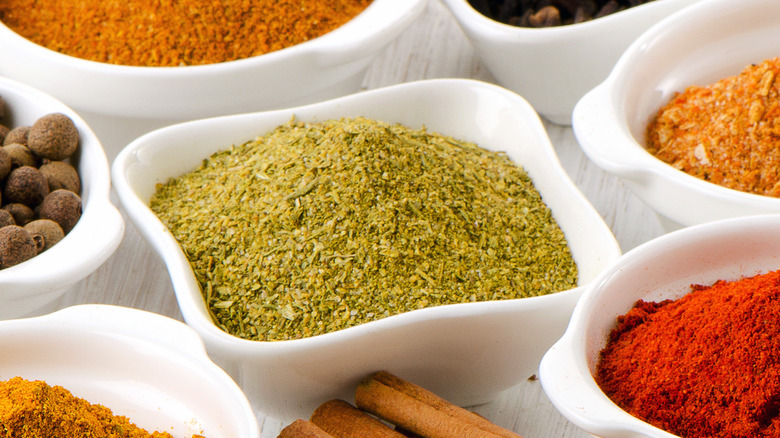Juniper Berries Are The Fall Seasoning Your Spice Cabinet Is Missing
With ever more access to enticing, aromatic spices from far-flung locales, it's hard to imagine one taking you by surprise — especially if it grows prolifically across the United States. We're talking about juniper berries, which, unlike common berries such as blueberries or strawberries, are used most often as a spice. In reality, juniper berries are actually female seed cones from juniper trees, but they're perceived and named as a berry. Regardless, the "berries" are the fall seasoning your spice cabinet has been missing all these years.
Toss out any notion of juniper berries being sweet, as that's not the primary flavor they bring to food. The complex flavor profiles of these berries are closer to other autumn offerings, such as tart cranberries and woodsy, lightly sweet elderberries. However, junipers carry their own defining pine-like notes, with overtones of citrus, as well as peppery and subtly floral aromatics. They're often compared to rosemary but have similar characteristics to thyme, sage and oregano.
If juniper flavor feels vaguely familiar, that's because it's the essential component and main flavor of gin. It's also commonly used for making less gamey venison as well as lamb, duck, and other types of meat. When using juniper berries as spices for cooking, it's best to avoid freshly plucked ones, as the intense flavor can be hard to wrangle into recipes — and some juniper berries are even inedible. Fortunately, many suppliers offer dried versions, either whole, crushed, or powdered, which are extremely convenient for spicing up your meals.
Jazz up your meals with juniper berry spice
Now that you know the merits and potentials of cooking with juniper berries, here's a deeper look at cooking with this somewhat mysterious spice. Remember that you'll be using a dried version of the little round cone "berries" for easily jazzing up meals. Think marinades, sauces, glazes, and rubs. These are the easiest carriers of juniper flavor, providing endless ways to stir or mix the spice into soups, stews, casseroles, or even sweet or savory breads and desserts. Glazes and rubs expand the potential to any kind of meat, fish, or even vegetables. Marinades are an excellent way for juniper flavor to permeate proteins, balancing out the gamey tastes of hunter's meats. They also help tenderize cuts that tend to be tough or dense. To bring out the citrusy element in juniper berries, consider adding zest, juice, or mashed soft fruits to a marinade or glaze.
Powdered or granulated juniper rubs help form a crispy outer layer on grilled, braised, or air-fried meats and seafood. They can also be sprinkled onto sauteed veggies, dashed into baked goods, or mixed into glazes. Regardless of application, recipes abound, including our favorite: juniper duck with corn and sage. It's a rich, earthy, sweet, and tangy dish that balances and counterbalances a riot of flavors from the duck, toasted and crushed juniper berries, brown sugar, honey, and a juxtaposed tart vinegar and corn relish.

